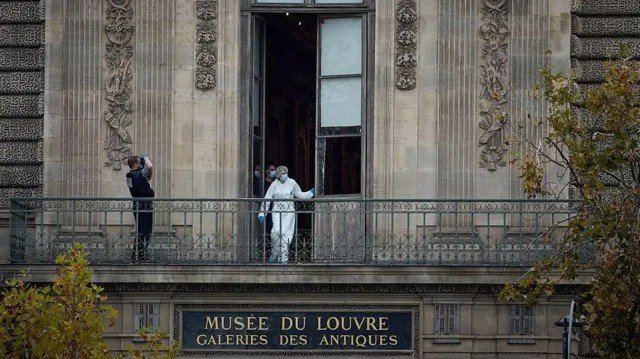By Isaac Christopher Lubogo
Abstract
The 19 October 2025 Louvre jewel heist exposed glaring institutional vulnerabilities, with eight historic crown jewels stolen in under four minutes. Significantly, the suspects attempted to flee to Algeria and Mali, former French colonies, adding layers of historical and symbolic meaning. This article examines the heist through legal, ethical, and post-colonial lenses, exploring the irony of heritage circulation, the role of insiders, and the implications for African cultural custodians. Recommendations include strengthened legal frameworks, technical modernization, interagency cooperation, and strategic heritage restitution policies.
I. Introduction
The heist is not merely a criminal incident but a mirror of unresolved historical injustices. The jewels stolen are emblematic of French monarchy and identity, yet their provenance is intertwined with colonial wealth extraction. That the suspects aimed for Algeria and Mali is poetically ironic: it is as if stolen heritage is seeking to return to lands from which Europe derived much of its wealth.
Uganda and other African nations can derive critical lessons here: heritage protection requires more than physical security; it demands awareness of historical context, legal preparedness, and cultural stewardship.
II. Factual and Contextual Background
Date and Location: 19 October 2025, Apollo Gallery, Louvre Museum, Paris.
Method: Rapid access via mechanical lift/truck, forced display cases, exit on scooters.
Stolen Items: Tiara, necklaces, earrings, diadems belonging to French queens and empresses.
Suspects: Arrested attempting flights to Algeria and Mali; INTERPOL involved.
Investigative Observations: CCTV gaps, delayed upgrades, procedural lapses; insider facilitation suspected.
III. Legal Analysis
A. Criminality and Insider Facilitation
High-value heists are frequently insider-assisted, suggesting collusion. Legally, France treats this as criminal conspiracy and breach of public duty, while Uganda must similarly define enhanced penalties for insider involvement, recognizing the cultural value of national heritage.
B. Cross-Border Flight
Attempted escape to Algeria and Mali invokes international criminal law concerns: extradition treaties, cross-border intelligence sharing, and mechanisms for rapid recovery of stolen cultural property.
C. Custodial Liability
The Louvre case demonstrates fiduciary duty: institutional negligence, deferred upgrades, or procedural lapses constitute a breach of public trust. Uganda must codify custodial responsibility with civil, criminal, and administrative remedies.
IV. Historical and Post-Colonial Dimensions
1. Colonial Extraction: Algeria and Mali were historic sources of wealth feeding France’s imperial coffers.
2. Symbolic Return: The suspects’ flight path represents an ironic inversion of colonial flows—stolen European property heading toward former colonies.
3. Cultural Resonance: Artifacts carry national memory, identity, and post-colonial grievances, highlighting the moral urgency of repatriation debates.
V. Ethical Reflection
Justice vs. History: Criminal law is clear; theft is illegal. Yet ethical reflection acknowledges the symbolic justice of returning looted heritage, revealing tension between legal and moral frameworks.
Civic Duty: African custodians must protect heritage proactively, not merely react after theft or restitution claims arise.
Institutional Integrity: Preventive governance strengthens legitimacy and public trust.
VI. Policy and Operational Lessons for Africa
1. Governance & Legal Reform
Criminalization of insider facilitation.
Clear statutory custodial duty.
Mandatory independent security audits.
2. Technical Safeguards
Zero blind-spot CCTV, sensor-fused displays.
Controlled logistics, including vehicles and manifests.
Emergency vaulting protocols and rehearsed drills.
3. Interagency and International Cooperation
MoUs with INTERPOL, border agencies, and regional law enforcement.
Asset registration in Stolen Works databases.
4. Heritage Repatriation Strategy
Strategic engagement with former colonial states for formal repatriation.
Public diplomacy to strengthen cultural identity and national pride.
VII. Lubogo- Synthesis
The Louvre heist illuminates a triadic relationship between law, history, and ethics. The suspects’ intended flight to Algeria and Mali is legally criminal yet symbolically resonant, highlighting the unfinished work of cultural justice in Africa. It underscores the need for proactive governance, interagency readiness, and ethical foresight.
VIII. Conclusion
The theft and cross-continental flight of the jewels serve as a mirror to Africa’s ongoing cultural reclamation struggle. While criminal law must prevail, African nations—Uganda included—must combine legal rigor, technical sophistication, and historical consciousness to protect heritage and assert moral legitimacy in repatriation debates.
Law without proactive protection is reaction; heritage without stewardship is hypocrisy.
References (Footnotes-Ready)
1. CNN, “Louvre Museum Jewel Heist: 19 October 2025,” accessed October 25, 2025.
2. France 24, “Inside-Job Hypothesis Investigated in Louvre Theft,” October 21, 2025.
3. INTERPOL, Stolen Works of Art Database, 2025.
4. The Guardian, “Two men reportedly arrested after Louvre jewel heist,” October 26, 2025.
5. Museums & Monuments Act (Uganda), Cap 215, 2018 edition.
6. Uganda National Museum, Conservation Planning Guidelines, 2022.








